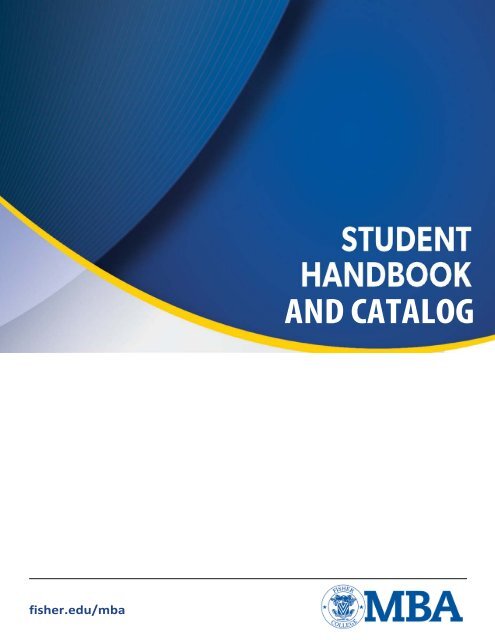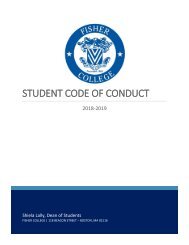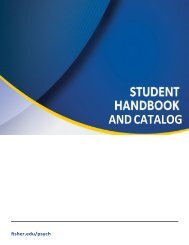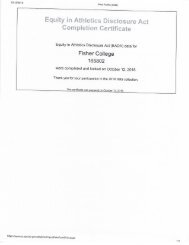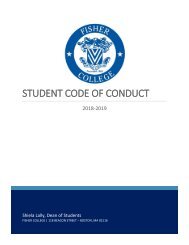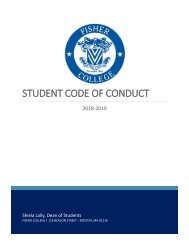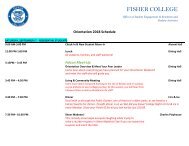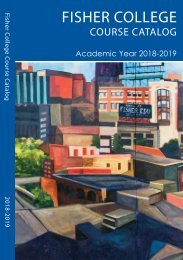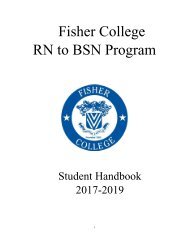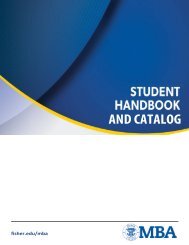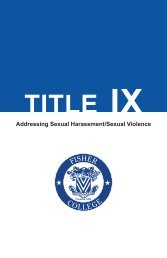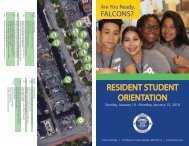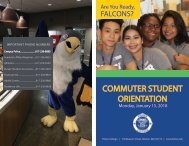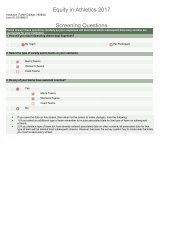MBA Catalog and Student Handbook_2019
You also want an ePaper? Increase the reach of your titles
YUMPU automatically turns print PDFs into web optimized ePapers that Google loves.
fisher.edu/mba<br />
AND CATALOG
MESSAGE FROM THE DEAN<br />
It is my pleasure to welcome you to the School of Graduate Studies at Fisher College. Our <strong>MBA</strong> is taught in case-based<br />
instruction over four terms per year. The program is very beneficial for working professionals who want to put to work<br />
what they learn. With a strategic leadership focus to our <strong>MBA</strong> program, it is suitable regardless of your current field of<br />
work <strong>and</strong> you can complete your <strong>MBA</strong> in as little as two years.<br />
The faculty are leaders in their field. Many of the faculty are published in scholarly peer reviewed journals <strong>and</strong> have<br />
done scholarly presentations. All of our faculty hold a doctorate as well as an <strong>MBA</strong> proving our commitment to<br />
academic excellence.<br />
Fisher College <strong>and</strong> the School of Graduate Studies faculty <strong>and</strong> staff are committed to making your business<br />
education engaging, affordable, flexible, <strong>and</strong> real-world. Please let us know if you have any questions <strong>and</strong> we<br />
welcome your feedback in helping us make this a very rewarding experience.<br />
Sincerely,<br />
Neil Trotta, Ed.D.<br />
Assistant Dean, <strong>MBA</strong> Program Director<br />
2 FISHER COLLEGE MASTER OF BUSINESS ADMINISTRATION
TABLE OF CONTENTS<br />
GRADUATE ACADEMIC POLICIES<br />
Admissions Requirements ....................................................................................................................................... 4<br />
International Applicants .......................................................................................................................................... 4<br />
Provisional Acceptance .......................................................................................................................................... 4<br />
Transfer Credit Policy ............................................................................................................................................... 4<br />
Prerequisites <strong>and</strong> Waivers ....................................................................................................................................... 4<br />
Graduate Degree Requirements............................................................................................................................ 5<br />
Grading System....................................................................................................................................................... 5<br />
Time Limit for Degree Conferral .............................................................................................................................. 5<br />
Degree Conferral .................................................................................................................................................... 5<br />
Participation in Commencement ............................................................................................................................. 5<br />
Incomplete Grades .................................................................................................................................................. 5<br />
Attendance Policy .................................................................................................................................................... 6<br />
Repeating a Course .................................................................................................................................................. 6<br />
Course Withdrawal ................................................................................................................................................. 6<br />
Leave of Absence Policy ........................................................................................................................................... 6<br />
Voluntary Withdrawal from the College .................................................................................................................. 6<br />
Administrative Withdrawal from the College .......................................................................................................... 6<br />
Re-Enrollment Following Voluntary Withdrawal from the College.......................................................................... 6<br />
Satisfactory Academic Progress: <strong>MBA</strong> Program ...................................................................................................... 6<br />
Re-Enrollment Following Academic Dismissal ......................................................................................................... 7<br />
Advisory Regarding Internet Sites <strong>and</strong> Other Blogs ................................................................................................. 7<br />
Family Educational Rights <strong>and</strong> Privacy ..................................................................................................................... 7<br />
Fire Safety (Boston Campus) .................................................................................................................................... 8<br />
College Property ..................................................................................................................................................... 8<br />
Alcohol <strong>and</strong> Drug Policy ........................................................................................................................................... 8<br />
Undergraduate Enrollment…………………………………………………………………………………………………………………………………..9<br />
Financial Aid Eligibility………………………………………………………………………………………………………………………………………….9<br />
Smoking & Tobacco ................................................................................................................................................ 9<br />
ACADEMIC INFORMATION<br />
Evaluation of <strong>Student</strong> Performance ......................................................................................................................... 9<br />
Fisher College Policy on Credit Hours ...................................................................................................................... 9<br />
Credit Hour Chart for 12-week Semester ................................................................................................................ 9<br />
PROGRAM ..............................................................................................................................................................................10<br />
COURSES…………………………………………………………………………………………………………………………………………………..11<br />
FACULTY .........................................................................................................................................................................…....15<br />
3 FISHER COLLEGE MASTER OF BUSINESS ADMINISTRATION
GRADUATE ACADEMIC POLICIES<br />
Admissions Requirements<br />
C<strong>and</strong>idates will complete <strong>and</strong> submit the <strong>MBA</strong> Admissions Application<br />
<strong>and</strong> supply the following documents to support their c<strong>and</strong>idacy.<br />
accompany the notarized bank statement from the holder of<br />
the account. Most consulates around the world require the<br />
student is able to pay for his or her entire program of study<br />
• GMAT (optional).<br />
• Official college transcripts from regionally accredited,<br />
undergraduate <strong>and</strong> graduate institutions attended. A cumulative<br />
GPA of 2.7 or higher is required for undergraduate degree<br />
programs. Successful completion of a graduate degree program is<br />
sufficient.<br />
• Resume: must be up-to-date <strong>and</strong> include educational <strong>and</strong><br />
professional information. If any information changes after you<br />
have applied, please send the graduate admissions office an<br />
updated resume.<br />
• Two letters of recommendation<br />
• Essay<br />
o<br />
o<br />
The topic for the <strong>MBA</strong> admissions essay is<br />
• Professional Aspirations.<br />
In 750 words or less, please address the following:<br />
• Why do you want to pursue an <strong>MBA</strong> at this point in your life?<br />
• What is your career goal?<br />
• In what way will the Fisher College <strong>MBA</strong> help you to<br />
fulfill your career goal?<br />
International Applicants<br />
In addition to the general admissions requirements, international<br />
applicants must also meet the following minimum qualifications to be<br />
considered for unconditional admission to the program.<br />
• Testing Requirements*<br />
o TOEFL internet-based test score: 80<br />
o TOEFL paper-based test score: 550<br />
o TOEFL computer-based test score: 210<br />
o IELTS b<strong>and</strong> score: 6.5<br />
• Official English translations of all required academic documents<br />
• A notarized, current bank statement verifying that the student<br />
has a minimum of $50,000 U.S. dollars in a cash account available<br />
for his or her use. If the bank account is not in the student’s<br />
name, then a notarized letter of support should<br />
* Required from c<strong>and</strong>idates whose native language is not English <strong>and</strong> who have not<br />
earned a bachelor’s or master’s degree from a U.S., U.K., Canadian, Australian, or<br />
New Zeal<strong>and</strong> college or university<br />
Provisional Acceptance<br />
• <strong>Student</strong>s who do not meet the requirements for admissions<br />
may be provisionally admitted to the program. <strong>Student</strong>s<br />
admitted provisionally may take no more than six graduate<br />
credit hours towards the <strong>MBA</strong> degree. After successful<br />
completion with a grade of B- or better, provisionally admitted<br />
students will be granted admission.<br />
• <strong>Student</strong>s who do not possess the foundation course work<br />
requirements for admission may be provisionally admitted to<br />
the program. <strong>Student</strong>s admitted provisionally may take no<br />
more than six graduate credits toward the <strong>MBA</strong> degree.<br />
Foundation coursework must be completed before or at the<br />
completion of six graduate credits. Upon completion of<br />
required foundation coursework, with a grade of B- or higher,<br />
the provisionally admitted student will be granted admission.<br />
• Foundation course work includes three credits of Economics<br />
<strong>and</strong> six credits of Accounting.<br />
Transfer Credit Policy<br />
<strong>Student</strong>s may apply not more than nine graduate credits, with<br />
a grade of B- or higher, transferred from another accredited<br />
graduate program<br />
Prerequisites <strong>and</strong> Waivers<br />
Applicants must have earned academic credit in the following<br />
Foundation course subject areas prior to matriculating; three credits<br />
of economics, <strong>and</strong> six credits of accounting. A grade of B- or higher<br />
must be earned in each category.<br />
Waivers of up to four core courses (possible courses for waiver<br />
identified below), will be approved based on applicable prerequisite<br />
coursework at the undergraduate or graduate level from an<br />
accredited institution with a grade of B- or higher, taken within the last<br />
five years. More than one course within a discipline will be required to<br />
4 FISHER COLLEGE MASTER OF BUSINESS ADMINISTRATION
meet the waiver. <strong>Student</strong>s with additional coursework, outside of this<br />
list, may petition the program director to determine waiver eligibility.<br />
Courses that are eligible for waiver are identified below:<br />
Grading System<br />
GRADE<br />
NUMERICAL<br />
VALUE<br />
GRADE POINTS<br />
Management, Teamwork, <strong>and</strong> Empowerment<br />
Minimum of 6 credits in<br />
• Management<br />
• Principles of Management (or similar)<br />
• Organizational Behavior<br />
Financial Reporting <strong>and</strong> Statement Analysis<br />
Minimum of 12 credits in accounting<br />
• 3 credits in managerial accounting<br />
• 3 credits in financial accounting<br />
• 6 credits in intermediate accounting<br />
Strategic Cost <strong>and</strong> Profitability Analysis<br />
Minimum of 6 credits in accounting <strong>and</strong> 3 credits in finance<br />
Marketing Management <strong>and</strong> Ecommerce<br />
Minimum of 6 credits in marketing<br />
Graduate Degree Requirements<br />
• Earn the number of credit hours <strong>and</strong> course requirements for<br />
the degree program.<br />
• Earn at least 46% of the required coursework at Fisher College<br />
This allows for the transfer acceptance or waiver of no more<br />
than twenty-one credits (7 classes).<br />
• Achieve a minimum cumulative GPA of 3.0.<br />
• Meet all program requirements.<br />
Part-time <strong>MBA</strong> Program Requirements<br />
• 10 core courses<br />
• The focus requirement of 3 three-credit courses.<br />
• The capstone requirement of 1 three-credit course designed to<br />
integrate knowledge gained in all previous coursework by<br />
demonstrating professional level skills <strong>and</strong> abilities in the student’s<br />
chosen focus.<br />
• Total of 14 courses <strong>and</strong> 41 credits.<br />
Full-Time <strong>MBA</strong> Program Requirements<br />
• 11 core courses<br />
• The focus requirement of 3 three-credit courses.<br />
• The capstone requirement of 1 three-credit course designed to<br />
integrate knowledge gained in all previous coursework by<br />
demonstrating professional level skills <strong>and</strong> abilities in the student’s<br />
chosen focus.<br />
• Total of 15 courses <strong>and</strong> 42 credits.<br />
A 93–100 4.0<br />
A- 90–92 3.7<br />
B+ 87–89 3.3<br />
B 83–86 3.0<br />
B- 80–82 2.7<br />
C+ 76–79 2.3<br />
C 70–75 2.0<br />
F 0–69 0.0<br />
INC= Incomplete<br />
A grade of C or higher is considered passing.<br />
Time Limit for Degree Conferral<br />
A master’s degree must be completed within five (5) years from the<br />
student’s first registration date in that master’s degree program.<br />
Requests for extensions of time limits must be petitioned by<br />
contacting the School of Graduate Studies dean.<br />
Degree Conferral<br />
Commencement exercises for all students are held once a year.<br />
<strong>Student</strong>s who complete all degree requirements during the prior<br />
summer, fall or winter term are invited to the commencement<br />
exercises.<br />
Participation in Commencement<br />
Fisher College holds one commencement ceremony each year. Parttime<br />
students in the <strong>MBA</strong> program with two (2) or fewer classes<br />
remaining are eligible to walk at commencement if they are<br />
registered for their final classes. Full-time students in the <strong>MBA</strong> program<br />
who are in their final classes at the time of commencement are<br />
eligible to walk at commencement. A full-time student with any classes<br />
remaining after the April-June term cannot walk at commencement.<br />
5 FISHER COLLEGE MASTER OF BUSINESS ADMINISTRATION
Incomplete Grades<br />
Rarely, for extenuating circumstances, during the last two weeks of a<br />
term, a student may petition for an incomplete (INC) if they cannot<br />
complete all coursework on time. In such cases, the student can request<br />
from the dean of the School of Graduate Studies that an incomplete<br />
be granted. If the request is approved, the student, the faculty<br />
member, <strong>and</strong> the Registrar will be notified of the decision in writing.<br />
It is the student’s responsibility to make arrangements with the<br />
faculty member to complete all course work <strong>and</strong> to submit it to<br />
him or her within 30 days of the end of the term in which it was<br />
granted. At the end of the 30-day period, if the course work has<br />
been submitted, the instructor will submit to the Registrar a Grade<br />
Change report with the received grade. If not, the Incomplete is<br />
converted to an ‘F’ grade <strong>and</strong> recorded on the student’s transcript.<br />
Leave of Absence Policy<br />
Graduate students may have a medical, psychological, or personal<br />
situation that impacts their ability to successfully complete their studies.<br />
In these situations, students may apply for a leave of absence. A leave<br />
of absence will result in withdrawal from the current term’s classes, but<br />
not withdrawal from the College. A leave of absence is granted for no<br />
less than one term <strong>and</strong> no more than one year. When ready to return,<br />
students must file the return request form <strong>and</strong> provide appropriate<br />
documentation to establish an ability to return to the College. The<br />
College LOA procedures are documented on the website.<br />
Voluntary Withdrawal from the College<br />
<strong>Student</strong>s wishing to withdraw from the College must submit a written<br />
notice of withdrawal to the dean of the School of Graduate Studies.<br />
The withdrawal date is the last date the student attends class.<br />
Attendance Policy<br />
<strong>Student</strong>s are expected to attend all face-to-face classes <strong>and</strong> be<br />
active in online or blended components of their courses. Each<br />
faculty member will designate their specific attendance policy.<br />
Repeating a Course<br />
Any student who fails a required course must repeat <strong>and</strong> pass the<br />
course before a degree can be awarded.<br />
• Courses in which a grade of F has been earned may be<br />
repeated one time only.<br />
• The repeated course must be identical to the original <strong>and</strong> must<br />
be taken at Fisher College.<br />
• Both the original <strong>and</strong> repeated grades will appear on the<br />
transcript. The repeated grade, whether higher or lower, is<br />
used to determine the cumulative grade-point average.<br />
Course Withdrawal<br />
• <strong>Student</strong>s may withdraw from a 12-week term no later than two<br />
weeks prior to the end of the term. <strong>Student</strong>s are expected to<br />
submit documentation to support their request to withdraw to<br />
the School of Graduate Studies dean.<br />
• The last day to withdraw for each term will be published each<br />
year in the academic calendar.<br />
Administrative Withdrawal from the College<br />
<strong>Student</strong>s who discontinue attending classes for two weeks will be<br />
subject to administrative withdrawal from the college.<br />
Re-Enrollment Following Voluntary Withdrawal from the<br />
College<br />
In general, students may re-enroll after a voluntary withdrawal as<br />
long as they are in good academic <strong>and</strong> financial st<strong>and</strong>ing with the<br />
College. <strong>Student</strong>s are subject to the College policies <strong>and</strong> program<br />
requirements in effect at the time of their re-enrollment. The<br />
College reserves the right to deny re-enrollment at its discretion.<br />
Satisfactory Academic Progress: <strong>MBA</strong> Program<br />
Satisfactory Academic Progress (SAP) is the term used to determine<br />
if a student is making acceptable progress toward a degree. A review<br />
of a student’s progress is conducted three times a year after each<br />
academic term. A student’s failure to meet Satisfactory Academic<br />
Progress st<strong>and</strong>ards, may result in academic dismissal.<br />
• After the first term, students with a 2.7 or lower GPA will be<br />
placed on academic probation.<br />
• After the 2nd term in the program students with a cumulative<br />
GPA of less than 3.0 will be dismissed from the program.<br />
• <strong>Student</strong>s who withdraw from a required course are expected to<br />
repeat the course.<br />
6 FISHER COLLEGE MASTER OF BUSINESS ADMINISTRATION
<strong>Student</strong>s will have the opportunity to appeal a dismissal to the<br />
office of the dean for the School of Graduate Studies.<br />
<strong>Student</strong>’s receiving financial aid are subject to financial aid<br />
regulations.<br />
Re-Enrollment Following Academic Dismissal<br />
Under certain circumstances, a student who has been academically<br />
dismissed may petition for re-enrollment to the dean of the School<br />
of Graduate Studies. <strong>Student</strong>s petitioning for re-enrollment into a<br />
graduate program must present evidence of ability <strong>and</strong> willingness<br />
to meet the College’s st<strong>and</strong>ards of academic performance. All<br />
requests for re-admission will be given careful consideration. Readmitted<br />
students may not be eligible for financial aid. <strong>Student</strong>s<br />
re-enrolled are subject to the College policies <strong>and</strong> program<br />
requirements in effect at the time of their re-enrollment. The College<br />
reserves the right to deny re-enrollment at its discretion.<br />
If the records are not maintained by the College official to whom<br />
the request was submitted, that official shall advise the student of<br />
the correct official to whom the request should be addressed.<br />
B) The right to request the amendment of the student’s education<br />
records that the student believes are inaccurate or misleading.<br />
<strong>Student</strong>s may ask the College to amend a record that they believe<br />
is inaccurate or misleading. They should write the College official<br />
responsible for the record, clearly identify the part of the record<br />
they want changed, <strong>and</strong> specify why it is inaccurate or misleading.<br />
If the College decides not to amend the record as requested by<br />
the student, the College will notify the student of the decision<br />
<strong>and</strong> advise the student of his or her right to a hearing regarding<br />
the request for amendment. Additional information regarding the<br />
hearing procedures will be provided to the student when notified<br />
of the right to a hearing.<br />
Advisory Regarding Internet Sites <strong>and</strong> Other Blogs:<br />
Fisher College does not as a matter of policy routinely monitor<br />
Internet sites (e.g., Facebook, Twitter, Instagram, blogs, etc.).<br />
However, if a student uses such sites <strong>and</strong> blogs to express<br />
sentiments or activities that are unlawful <strong>and</strong>/or violate the policies<br />
of the College, <strong>and</strong> such practice is brought to an administrator’s<br />
attention, then the College will review the sites <strong>and</strong> the material<br />
posted therein. After reviewing the material, the administrator<br />
will then address that practice with the student. For a student, the<br />
incident will be addressed by the student conduct process. Please<br />
be advised that posting personal <strong>and</strong>/or questionable material<br />
on sites <strong>and</strong> blogs might jeopardize personal safety <strong>and</strong>/or future<br />
career prospects.<br />
Family Educational Rights <strong>and</strong> Privacy<br />
Fisher College complies with the Family Educational Rights <strong>and</strong><br />
Privacy Act (FERPA) regarding the access <strong>and</strong> release of student<br />
records <strong>and</strong> information. FERPA affords students certain rights with<br />
respect to their education records:<br />
A) The right to inspect <strong>and</strong> review the student’s education records<br />
within 45 days of the day the College receives a request for<br />
access. <strong>Student</strong>s should submit to the Registrar, Vice President for<br />
Academic Affairs, Site Coordinator, or other appropriate official<br />
written requests that identify the record(s) they wish to inspect. The<br />
College official will make arrangements for access <strong>and</strong> notify the<br />
student of the time <strong>and</strong> place where the records may be inspected.<br />
C) The right to consent to disclosures of personally identifiable<br />
information contained in the student’s education records, except to<br />
the extent that FERPA authorizes disclosure without consent. One<br />
exception that permits disclosure without consent is disclosure<br />
to school officials with legitimate educational interests. A school<br />
official is a person employed by the College in an administrative,<br />
supervisory, academic or research, or support staff position<br />
(including law enforcement unit personnel <strong>and</strong> health staff); a person<br />
or company with whom the College has contracted (such as an<br />
attorney, auditor, or collection agent); a person serving on the Board<br />
of Trustees; or a student serving on an official committee, or assisting<br />
another school official in performing his or her tasks. A school official<br />
has a legitimate educational interest if the official needs to review an<br />
education record to fulfill his or her professional responsibility.<br />
D) The right to file a complaint with the U.S. Department of<br />
Education concerning alleged failures by Fisher College to comply<br />
with the requirements of FERPA.<br />
Office Address:<br />
Family Policy Compliance Office<br />
U.S. Department of Education<br />
600 Independence Avenue, SW<br />
Washington, DC 20202-4605<br />
E) For the purpose of this Act, Fisher College defines all students<br />
as independent. A parent may be awarded the same rights as the<br />
7 FISHER COLLEGE MASTER OF BUSINESS ADMINISTRATION
student with regard to educational records <strong>and</strong> other confidential<br />
information only if the student signs a written consent to this effect,<br />
or if the parent supplies proof of dependency, as defined in section<br />
152 of the Internal Revenue Code of 1954, which requires receipt of<br />
a certified copy of the parent’s most recent federal income tax form.<br />
The College does not release confidential information to outside<br />
parties without the student’s written authorization except as required<br />
or permitted by law. <strong>Student</strong>s must provide the College with a<br />
signed letter before any confidential information will be released.<br />
The following information should be included in the request:<br />
• Name<br />
• Address<br />
• Date of birth<br />
• <strong>Student</strong> ID or SSN<br />
• Attendance dates<br />
• Academic major<br />
• Address to which information should be sent<br />
• Signature<br />
The following items, however, are considered “directory information”<br />
<strong>and</strong> may be released at the discretion of the College upon request.<br />
• Name<br />
• Address<br />
• Telephone number<br />
• E-mail address<br />
• Dates of enrollment<br />
• Academic major<br />
• Full- or part-time status<br />
• Year of study<br />
• Date of graduation or withdrawal<br />
• Degrees, certificates, or awards earned<br />
• Participation in officially recognized sports or activities<br />
• Most recent educational institution attended by the student<br />
• Weight <strong>and</strong> height of members of the athletic teams<br />
Under the provisions of FERPA, currently enrolled students have<br />
the right to withhold disclosure of directory information, except as<br />
authorized by law. To withhold disclosure, students should submit<br />
written notification to the College Registrar or DAPS Site Coordinator<br />
within 30 days of the student’s initial semester or term at Fisher, <strong>and</strong><br />
thereafter by September 30 of each subsequent academic year.<br />
completed each academic year. Fisher College assumes that failure<br />
by any student to request the withholding of directory information<br />
indicates approval for disclosure.<br />
Fire Safety (Boston Campus)<br />
Fisher College properties are equipped with a modern, sophisticated<br />
fire <strong>and</strong> smoke alarm system. Fire drills are held regularly in the<br />
Residence Halls <strong>and</strong> classrooms to ensure the safety of students in<br />
case of emergency. All students must evacuate the premises each time<br />
the alarm sounds. Any student who does not is subject to a fine <strong>and</strong>/<br />
or dismissal from the College. <strong>Student</strong>s are disciplined immediately<br />
if they activate an alarm or use the fire extinguisher unnecessarily.<br />
Anyone found to have intentionally set off a false alarm will be fined<br />
$500 (the cost of resetting the alarm), <strong>and</strong> may be suspended <strong>and</strong>/<br />
or dismissed from the College. This act might also lead to criminal<br />
prosecution. (See the <strong>Student</strong> Code of Conduct for details.)<br />
College Property<br />
Fisher College takes pride in the fine buildings <strong>and</strong> equipment<br />
provided for its students at all locations <strong>and</strong> asks student<br />
cooperation in keeping the classrooms <strong>and</strong> equipment in excellent<br />
condition. Please report any noticed waste, damage, destruction,<br />
or theft to College personnel. Additionally, anyone responsible for<br />
damage may be subject to disciplinary action <strong>and</strong> restitution.<br />
Alcohol <strong>and</strong> Drug Policy<br />
Attending class or a college event under the influence of alcohol<br />
or drugs is forbidden. Massachusetts state law prohibits the<br />
possession <strong>and</strong> consumption of alcoholic beverages by anyone<br />
under 21 years of age. At Fisher College, no students regardless<br />
of age may possess, consume, or transport alcohol onto the<br />
Fisher College campus. <strong>Student</strong>s, as adults, are expected to obey<br />
the law <strong>and</strong> take personal responsibility for their conduct. Any<br />
student who uses alcohol will be held accountable for his or her<br />
behavior, including such acts as disorderly conduct, public<br />
disturbance, exposure of himself or herself or others to personal<br />
injury, <strong>and</strong> damage to property. Under Massachusetts <strong>and</strong> federal<br />
laws, possession of dangerous drugs <strong>and</strong> narcotics, including<br />
marijuana, is regarded as a misdemeanor or felony. If a student has<br />
a problem with alcohol or drugs, the College will try to help, but<br />
will not interfere with the legal prosecution of any member of the<br />
community who is apprehended for possessing or using drugs.<br />
Forms for this purpose are available in the Office of the Registrar<br />
<strong>and</strong> at each DAPS location. A new form for non-disclosure must be<br />
Each student must be aware of his/her responsibility for<br />
upholding these laws. Infractions should be reported to the<br />
8 FISHER COLLEGE MASTER OF BUSINESS ADMINISTRATION
College administration. The College takes drug/alcohol abuse very<br />
seriously; therefore, any infraction makes a student liable to<br />
immediate dismissal from Fisher College. The College reserves the<br />
right to examine any student’s residence hall room, locker, or<br />
belongings if it has a reasonable belief that illegal or illicit activity<br />
is taking place. The College also reserves the right to immediately<br />
dismiss a student from housing or from the College if he or she is<br />
found in violation of the Alcohol <strong>and</strong> Drug Policy.<br />
Smoking & Tobacco<br />
Fisher College has established a no-smoking policy throughout the<br />
college. No smoking is allowed in the common areas, which<br />
include: corridors, classrooms, auditoriums, or residence<br />
halls. There is a smoking area located behind building 116 Beacon<br />
Street. This policy results from the College’s compliance with the<br />
Massachusetts Clear Air Act. If a student is smoking on the Beacon<br />
Street side, the student will be required to move to the designated<br />
smoking area. Chewing tobacco is also not to be consumed in<br />
any College building. Failure to abide by the Smoking & Tobacco<br />
Policy will result in disciplinary action. The College also offers<br />
educational programs regarding the hazards of smoking <strong>and</strong><br />
tobacco use. <strong>Student</strong>s seeking to learn more about these hazards<br />
or interested in quitting smoking or tobacco use may contact the<br />
Health Services Office <strong>and</strong>/or Counseling Services.<br />
Policy on Undergraduates Enrolling in Graduate<br />
Courses<br />
Day Division Undergraduate students in their senior year (90<br />
credits earned) of study, who meet the general admissions<br />
Enrollment Status <strong>and</strong> Financial Aid Eligibility<br />
To be considered full-time, a student must be enrolled in 12 or<br />
more credits. Financial Aid eligibility will be determined based<br />
on the division in which the student is seeking the<br />
undergraduate degree. <strong>Student</strong>s who choose to cross-enroll in<br />
each of the Colleges’ divisions will not have a combined<br />
enrollment threshold reported to the National <strong>Student</strong> Loan<br />
Data System (NSLDS).<br />
ACADEMIC INFORMATION<br />
Fisher College Policy on Credit Hours<br />
Fisher College adheres to the United States Department of Education<br />
definition of the credit hour. As such, each credit hour reasonably<br />
approximates one hour of class time or faculty instruction <strong>and</strong> two<br />
hours out-of-class student work each week, for approximately 12<br />
weeks.<br />
<strong>Student</strong>s are informed via their syllabus of the classroom <strong>and</strong> out- of-class<br />
requirements for each class.<br />
Credit hour chart for 12-week semester:<br />
CREDITS<br />
HOURS OF<br />
INSTRUCTION<br />
1 15 30<br />
3 45 90<br />
OUT-OF-CLASS<br />
st<strong>and</strong>ards for the Graduate school <strong>and</strong> the required<br />
prerequisites, are permitted to enroll in a maximum of two<br />
graduate courses providing those courses can be used as a<br />
program requirement or free elective in the undergraduate<br />
program. <strong>Student</strong>s seeking to cross-enroll must currently be<br />
enrolled in a minimum of 9 credits or more. Enrollment for<br />
such courses must be signed off by the student’s<br />
undergraduate Advisor, Graduate Program Director <strong>and</strong><br />
meet final approval of the Registrar’s Office. Approved<br />
Courses will double count toward the Graduate program as<br />
well as the Undergraduate program.<br />
9 FISHER COLLEGE MASTER OF BUSINESS ADMINISTRATION
Program Information<br />
General<br />
The Master of Business Administration degree at Fisher College will focus on Strategic Leadership. The <strong>MBA</strong> program has been designed to prepare<br />
students for increased responsibility through the development, practice, <strong>and</strong> application of knowledge <strong>and</strong> skills used by highly successful business<br />
professionals today. Knowledge is not enough. Professional skill sets are required that will give the student the ability for success in positions with higher<br />
levels of responsibility. Therefore, the vision for the program’s course design <strong>and</strong> development is based on practical professional applications of<br />
knowledge based on business cases. The program will utilize small student teams for social <strong>and</strong> experiential learning activities that are focused on the<br />
practice of applicable skills for solving current problems in realistic learning environments.<br />
<strong>MBA</strong> Sport Administration Focus Description<br />
Fisher College’s <strong>MBA</strong> in Strategic Leadership with a focus in Sport Administration leverages the foundational business administration knowledge <strong>and</strong><br />
professional skills students have gained in their courses to examine current trends <strong>and</strong> opportunities for success in the sport industry. <strong>Student</strong>s who pursue<br />
the <strong>MBA</strong> in Sport Administration gain specialized knowledge of the strategies <strong>and</strong> tools utilized by sport professionals to effectively sell, manage venues,<br />
<strong>and</strong> build br<strong>and</strong>s in the sport industry.<br />
<strong>MBA</strong> Accounting Focus Description<br />
Fisher College’s <strong>MBA</strong> in Strategic Leadership with a focus in Accounting, provides students with the knowledge necessary to succeed in financial<br />
management positions in industry, public accounting <strong>and</strong> not-for-profit organizations. Upon the successful completion of the program, students that<br />
earned at least 21 credit hours in accounting at the undergraduate level, plus a combined total of 24 credit hours at either the graduate or undergraduate<br />
level in business related courses, will fulfill the education requirement for licensure as a Certified Public Accountant in Massachusetts. The program’s<br />
courses will provide key insight to areas tested in the Unified Certified Public Accountant exam.<br />
10 FISHER COLLEGE MASTER OF BUSINESS ADMINISTRATION
COURSES<br />
<strong>MBA</strong>5000 Executive Level Presentation <strong>and</strong> C omm unication.................................................................................................... 2 Credit Hours<br />
<strong>Student</strong>s will focus on the practical application of small group <strong>and</strong> organizational communication. Through the practice of written <strong>and</strong><br />
communication assignments, students will develop the skills necessary to communicate effectively with both supervisors <strong>and</strong> subordinates.<br />
Targeting a variety of internal <strong>and</strong> external publics, students will develop the rhetorical skills needed to express ideas cogently <strong>and</strong> with conviction.<br />
The learning experience will also draw on communication <strong>and</strong> persuasion scholarship to show students how natural ability can be enhanced through<br />
the study <strong>and</strong> application of communication theory <strong>and</strong> best practices.<br />
<strong>MBA</strong>5010 Orientation to <strong>MBA</strong> studies.................................................................................................................................... 1 Credit Hour<br />
This course will help to prepare students for the rigors of graduate level studies. <strong>Student</strong> will gain proficiency in academic learning management<br />
system utilization, including online video conferencing. <strong>Student</strong>s will also become proficient in the use of American Psychological Association<br />
(APA) writing style, referencing <strong>and</strong> citation methods required for graduate level research <strong>and</strong> writing. Finally, the principles of case-based learning,<br />
including research, analysis, collaboration <strong>and</strong> presentation of business cases will be covered.<br />
<strong>MBA</strong>5020 Management, Teamwork, <strong>and</strong> Empowerment (Foundation).....................................................................................3 Credit Hours<br />
<strong>Student</strong>s will explore contemporary topics concerning the opportunities <strong>and</strong> challenges of leading <strong>and</strong> managing diverse organizations. This course<br />
identifies management history <strong>and</strong> theories as well as current issues in management within work environments. Managerial functions, roles <strong>and</strong><br />
responsibilities will be reviewed. Current issues in management will be evaluated <strong>and</strong> students will evaluate different strategies to address these<br />
issues. This course also provides students with opportunities to evaluate methods used by effective leaders for motivating, teambuilding, coaching,<br />
<strong>and</strong> empowering a workforce. Negotiation <strong>and</strong> conflict management will be explored along with specific strategies to address management in a<br />
diverse workforce. <strong>Student</strong>s will conduct individual research <strong>and</strong> group projects on selected topics in management. <strong>Student</strong>s will complete a selfassessment<br />
at the end of the course to evaluate the strategies <strong>and</strong> skills they developed <strong>and</strong> to identify skills that require further development.<br />
<strong>MBA</strong>5050 Leading Organizational Change............................................................................................................................. 3 Credit Hours<br />
<strong>Student</strong>s will analyze traits <strong>and</strong> characteristics of effective leadership. They will compare the need for leadership with the requirements for<br />
management <strong>and</strong> the associated organizational behavioral patterns, attitudes, <strong>and</strong> perceptions of historical leadership figures. The course<br />
also focuses on the planning <strong>and</strong> control of organizational <strong>and</strong> behavioral changes in a dynamic business environment. Skill development<br />
will include the choice <strong>and</strong> application of appropriate change techniques traditionally used to evaluate <strong>and</strong> implement various organizational change<br />
processes. The course will also analyze typical conflict situations that are normally associated with organizational change. Leadership scenarios in a<br />
variety of industry situations will be analyzed <strong>and</strong> possible courses of action evaluated. <strong>Student</strong>s will develop a greater underst<strong>and</strong>ing of the<br />
complex <strong>and</strong> dynamic nature of organizational change. Case studies, students’ past experiences, instruments, <strong>and</strong> other learning activities provide<br />
opportunities for students to assess <strong>and</strong> develop their leadership talents.<br />
<strong>MBA</strong>5100 Decision-Making Analysis Methods for Managers.................................................................................................... 3 Credit Hours<br />
<strong>Student</strong>s will develop skills for evaluating <strong>and</strong> organizing data using applicable software applications. This course focuses on methods of developing<br />
information from internal <strong>and</strong> external data through the use of statistical analysis. Multiple scenarios of decisions typically required by<br />
management will be utilized. <strong>Student</strong>s will then develop courses of action based on their analysis of these scenarios. <strong>Student</strong>s will present multiple<br />
types of quantitative data analysis reports, which will include recommended courses of action, to fellow students for peer review. <strong>Student</strong>s will<br />
practice critical thinking by providing feedback on presented reports. Case studies, students’ past experiences <strong>and</strong> other introspective learning<br />
activities provide opportunities for students to assess <strong>and</strong> develop their communications skills <strong>and</strong> underst<strong>and</strong> best practices.<br />
<strong>MBA</strong>5150 Value-Based Operations <strong>and</strong> Logistics Management Practice............................................... 3 Credit Hours<br />
<strong>Student</strong>s will develop skills required of mid-level managers for the practical application of operations <strong>and</strong> logistics concepts. <strong>Student</strong>s will analyze<br />
<strong>and</strong> evaluate, <strong>and</strong> apply methods <strong>and</strong> techniques used in planning <strong>and</strong> management of coordination between suppliers, manufacturers,<br />
distributors, <strong>and</strong> retailers to ensure that products <strong>and</strong> services are available to the final consumer in a timely <strong>and</strong> cost-effective fashion.<br />
11 FISHER COLLEGE MASTER OF BUSINESS ADMINISTRATION
<strong>Student</strong>s will develop an underst<strong>and</strong>ing of the management of the physical flows of products, which includes such activities as transportation<br />
management, warehousing, materials h<strong>and</strong>ling, inventory management, <strong>and</strong> order fulfillment. Integrated learning objectives will include<br />
knowledge, skills <strong>and</strong> abilities development for the creation, <strong>and</strong> management of quality improvement within a firm’s processes <strong>and</strong> systems<br />
for the creation <strong>and</strong> delivery of products <strong>and</strong> services. This includes operational views of supply chain, product development, <strong>and</strong> capacity<br />
analysis, highlighting the competitive advantages that operations <strong>and</strong> logistics can provide a small business. <strong>Student</strong>s will develop a business operations<br />
model that can be implemented or used within a business plan.<br />
<strong>MBA</strong>5200 Financial Reporting <strong>and</strong> Statement Analysis (Foundation)....... .............................. .. . .3 Credit Hours<br />
This course develops the tools required to present <strong>and</strong> analyze financial statements prepared in accordance with Generally Accepted Accounting<br />
Principles (GAAP). Analytical tools, such as performance comparisons <strong>and</strong> financial ratios, are used to measure financial position in order to make<br />
investment <strong>and</strong> financing decisions. Additional topics of discussion will include; acquisition cost versus fair value, the usefulness of the Statement<br />
of Cash Flow, limitations of the Balance Sheet <strong>and</strong> Income Statement, as well as regulatory issues concerning publicly held companies as required<br />
by the Securities <strong>and</strong> Exchange Commission (SEC) <strong>and</strong> the Sarbanes Oxley Act. The course utilizes a case study approach.<br />
<strong>MBA</strong>5250 Strategic Cost <strong>and</strong> Profitability Analysis (Foundation)........... .............................. . . .3 Credit Hours<br />
This course is a management-oriented survey of tools <strong>and</strong> techniques related to profitably managing business operations, focusing on an integrated view<br />
of how businesses operate to improve both their bottom lines <strong>and</strong> their ability to achieve strategic results. Managers need to develop a<br />
working underst<strong>and</strong>ing of st<strong>and</strong>ard techniques, structures <strong>and</strong> processes used by businesses to analyze <strong>and</strong> plan their business activities <strong>and</strong><br />
develop a creative analytical perspective from which to view quantitative data as it relates to strategy implementation. Tools to be covered<br />
include: budgeting, variance analysis, activity-based costing, the cost of quality, cost-volume-profit analysis, the Balanced Scorecard, return on<br />
investment, residual income, economic value added, net present value, the weight-average cost of capital, discounted payback period, corporate<br />
social responsibility/creating shared value <strong>and</strong> the Boston Consulting Group (BCG) Growth Share Matrix. The course will be<br />
supplemented with relevant cases.<br />
<strong>MBA</strong>5300 Global Economics <strong>and</strong> Managerial Decision Making.......... .. .............................. .. . .3 Credit Hours<br />
This course addresses fundamental micro- <strong>and</strong> macro-economic concepts, <strong>and</strong> applies those concepts to a variety of business management situations.<br />
The course provides a working knowledge of global economics, including classical <strong>and</strong> current economic theories; the effects of society, politics <strong>and</strong><br />
government on a nation’s economic system; <strong>and</strong> competitive comparison of various national economies, as they currently operate. Additionally, current<br />
topics concerning global trade <strong>and</strong> monetary systems are studied. Critical thinking methods for resolving or mitigating<br />
economic based business problems are evaluated <strong>and</strong> applied using case based learning. Variables within cyclical <strong>and</strong> structural economic changes<br />
are evaluated to develop strategies for maintaining a firm’s economic growth. The use of data <strong>and</strong> information for developing risk analysis models<br />
to assess the likelihood of success of strategic decisions is also studied.<br />
<strong>MBA</strong>5500 Marketing, Management, <strong>and</strong> E-commerce.............. ...... ............................... . . .3 Credit Hours<br />
<strong>Student</strong>s will apply fundamental marketing concepts to a variety of business management situations. The course provides a working knowledge<br />
of product development, pricing, distribution, promotion, consumer behavior, <strong>and</strong> the ways in which this knowledge can be usefully<br />
employed by managers in various business roles. The course develops practical skills in analyzing marketing problems <strong>and</strong> opportunities, <strong>and</strong><br />
in developing comprehensive marketing programs for traditional brick-<strong>and</strong>-mortar <strong>and</strong> web-based business models. Additionally, the role of social<br />
networks, information technology, <strong>and</strong> information systems is connected with current innovative marketing management practices.<br />
<strong>MBA</strong>5600 Comparative Case Studies in Business Law <strong>and</strong> Ethics...... .... ............................... .. .3 Credit Hours<br />
This course provides an overview of the history <strong>and</strong> present day operation of the criminal justice process in the United States. <strong>Student</strong>s will analyze<br />
the role, responsibility, <strong>and</strong> authority of each of the components of the system: police, courts, corrections, <strong>and</strong> the underlying principles<br />
<strong>and</strong> values of justice. Additionally students will learn various methods of writing as they pertain to the discipline of criminal justice such as: article<br />
critiques; annotated bibliographies; reaction papers; police, probation <strong>and</strong> parole reports; agency case studies <strong>and</strong> policy analysis papers.<br />
12 FISHER COLLEGE MASTER OF BUSINESS ADMINISTRATION
<strong>MBA</strong>6000<br />
Leadership in Government <strong>and</strong> External Relations............................................. . .3 Credit Hours<br />
This course focuses on developing diagnostic <strong>and</strong> problem solving skills relative to external stakeholder management by having students participate<br />
in numerous collaborative analyses of business cases. <strong>Student</strong>s will evaluate strategies <strong>and</strong> tactics for developing a socially responsible<br />
organizational culture <strong>and</strong> for addressing societal implications of business actions. Special attention will be placed on government relations <strong>and</strong><br />
political activities <strong>and</strong> implications. <strong>Student</strong>s conduct research on best practices relative to the economic, legal, social <strong>and</strong> ethical implications of<br />
their business activities <strong>and</strong> interactions. Simulations are used to practice techniques for performing strategic <strong>and</strong> operational analyses <strong>and</strong> problem<br />
solving in a highly competitive business–government-society relationship environment.<br />
<strong>MBA</strong>6200 Forensic Accounting <strong>and</strong> Fraud Examination.............. ...... .................... . .3 Credit Hours<br />
Pre-Requisite:<br />
<strong>MBA</strong>5200<br />
This course explores forensic accounting, fraud examination <strong>and</strong> the qualifications necessary to enter this specialized field of accounting. Topics will<br />
include: engagement acceptance, privileged communication, the judicial system, methods of investigation used to gather <strong>and</strong> transform data into<br />
evidence, financial statement analysis, the fraud triangle, the fraud diamond, <strong>and</strong> business valuation. The American Institute of Certified Public<br />
Accountants (AICPA), code of professional conduct will be discussed, as well as, the st<strong>and</strong>ards instituted by the Association of Certified Fraud<br />
Examiners (ACFE) <strong>and</strong> the National Association of Certified Valuators <strong>and</strong> Analyst (NACVA).<br />
<strong>MBA</strong>6250 Governmental <strong>and</strong> Not-For-Profit Accounting................... ..................... . . 3 Credit Hours<br />
Pre-Requisite:<br />
<strong>MBA</strong>5200<br />
This course will introduce students to accounting practices utilized by government agencies <strong>and</strong> not-for-profit organizations. Topics will include fund<br />
accounting, the budgeting process, cash flow management, controlling expenditures, analysis of capital projects, obtaining tax exempt status,<br />
financial reporting <strong>and</strong> disclosure. The Government Accounting St<strong>and</strong>ards Board (GASB) <strong>and</strong> Generally Accepted Accounting Principles (GAAP) will<br />
be discussed, as well as, current topics <strong>and</strong> developments in GASB, Financial Accounting St<strong>and</strong>ards Board (FASB) <strong>and</strong> the American Institute of<br />
Certified Public Accounts (AICPA).<br />
<strong>MBA</strong>6255 Business Valuation <strong>and</strong> Fair Value Accounting.................. ...................... . .3 Credit Hours<br />
Pre-Requisite:<br />
<strong>MBA</strong>5200<br />
This course explores business valuations <strong>and</strong> fair value measurement. Topics examined include: valuation services, valuation methods, sources of<br />
data, <strong>and</strong> professional st<strong>and</strong>ards practiced by the American Institute of Certified Public Accountants (AICPA). Additionally, economic <strong>and</strong> financial<br />
statement analysis will be integrated throughout the course. Tools for performing business valuations <strong>and</strong> analysis techniques applied in evaluating<br />
valuation engagement are examined in relation to real-world scenarios.<br />
<strong>MBA</strong>6300 International Business Analysis, Strategy, <strong>and</strong> Planning....................................... . . .3 Credit Hours<br />
This course is designed to investigate the economic performance of markets operating internationally from various global regions. Particular<br />
attention will be given to emerging economies, which pose a variety of new challenges when compared to the economies found in the developed<br />
markets. <strong>Student</strong>s will analyze <strong>and</strong> apply economic theories <strong>and</strong> international business practices to develop new strategies needed to<br />
respond to the economies studied. Additionally, this course positions students as managers taking part in business negotiation issues with the goal<br />
of giving them confidence to do their part in an interactive international trade environment. Therefore, during learning activities, students will<br />
be required to integrate cultural <strong>and</strong> economic knowledge of a specific nation with tactics used in business negotiations. Ultimately, this<br />
course will provide students with opportunities to develop new knowledge <strong>and</strong> skills that business managers at all levels will need to h<strong>and</strong>le<br />
tasks <strong>and</strong> achieve objectives within a global marketplace.<br />
13 FISHER COLLEGE MASTER OF BUSINESS ADMINISTRATION
<strong>MBA</strong>6400 Venue Management in Sport. . . . . . . . . . . . . . . . . . . . . . . . . . . . . . . . . . . . . . . . . . . . . . . . . . . . . . . .3 Credit<br />
Hours<br />
This course is designed to introduce students to the scope <strong>and</strong> complexity of venue management in sport. <strong>Student</strong>s will examine the skills <strong>and</strong><br />
knowledge required to effectively administer sport venues, including stadiums, playing fields, arenas, parks, <strong>and</strong> other sport <strong>and</strong> recreational<br />
spaces found in corporate, campus, <strong>and</strong> community settings.<br />
<strong>MBA</strong>6410 Consumer Sales Strategies in Sport. . . . . . . . . . . . . . . . . . . . . . . . . . . . . . . . . . . . . . . . . . . . . . . . . . . . . . . .3<br />
Credit<br />
Hours<br />
This course offers an in-depth examination of the principles of professional selling <strong>and</strong> developing long-term partnerships in the sport industry.<br />
<strong>Student</strong>s examine the strategies utilized to build relationships <strong>and</strong> partnerships with customers, <strong>and</strong> to master communication styles <strong>and</strong><br />
presentations. Methods to negotiate buyer concerns are analyzed <strong>and</strong> applied in the developmental part of a sales management plan <strong>and</strong><br />
consultative sales presentation. An emphasis is places on the four components of the consultative selling strategy.<br />
<strong>MBA</strong>6420 Strategic Br<strong>and</strong>ing in the Sport Industry....................... ............................... . .3 Credit Hours<br />
The purpose of this course is to advance students’ underst<strong>and</strong>ing of the principles of strategic br<strong>and</strong> management as they are applied in the<br />
sport industry. <strong>Student</strong>s will examine how sport organizations create profitable br<strong>and</strong> strategies by building, measuring, <strong>and</strong> managing br<strong>and</strong><br />
equity. The course introduces students to the research on potential effects <strong>and</strong> trade-offs of various strategies <strong>and</strong> tactics used by sport<br />
strategists to build <strong>and</strong> manage profitable br<strong>and</strong> strategies. This course integrates business theory <strong>and</strong> application to help students underst<strong>and</strong><br />
how organizations use br<strong>and</strong>ing to achieve a sustainable competitive advantage. Additional emphasis is placed on crucial tools required for<br />
br<strong>and</strong> success, including digital marketing, social media management, market intelligence, <strong>and</strong> data analytics.<br />
<strong>MBA</strong>6500 Market Analysis, Strategy, <strong>and</strong> Planning................ ....... ..................... .......... . . 3 Credit Hours<br />
This course is designed as an advanced study covering the total process of generating, evaluating, <strong>and</strong> transforming data into relevant information for<br />
use by a marketing decision-maker. The learning goal is to connect how possible marketing strategies are developed through the use of segmentation,<br />
targeting, <strong>and</strong> positioning in a global marketplace with the effective collection <strong>and</strong> analysis of market research data. Topics include research<br />
methodology, design techniques, survey development, sampling theories <strong>and</strong> techniques for statistical data analysis. Additionally, concepts for<br />
effective planning, executing <strong>and</strong> evaluating br<strong>and</strong> management are matched with marketing research methods. Case studies <strong>and</strong> practical<br />
application projects are integrated throughout the course.<br />
<strong>MBA</strong>6600 Strategic Human Resource Management <strong>and</strong> Labor Relations. . . . . . . . . . . . . . . . . . . . . . . . . . . . . . . . . . . . .3 Credit Hours<br />
This course addresses traditional human resources concerns (employee recruitment <strong>and</strong> selection, training <strong>and</strong> development, compensation,<br />
performance appraisal, <strong>and</strong> employee misconduct) within the context of operational <strong>and</strong> strategic planning. It also presents various labormanagement<br />
issues (union organization <strong>and</strong> representation, collective bargaining <strong>and</strong> negotiations, grievance <strong>and</strong> arbitration processes, wages<br />
<strong>and</strong> salaries, <strong>and</strong> state or federal labor agencies) that employers <strong>and</strong> employees confront in today’s union <strong>and</strong> non-union corporate environments. A<br />
major focus of this course is on developing diagnostic <strong>and</strong> problem solving skills by having students participate in numerous role-playing, as well as<br />
analyze various human resource issues that mid-level managers are likely to encounter. <strong>Student</strong>s conduct <strong>and</strong> present in-depth research on current<br />
topics in the field of human resources.<br />
<strong>MBA</strong>6999 Industry Analysis, Strategy, <strong>and</strong> Planning (Capstone). . . . . . . . . . . . . . . . . . . . . . . . . . . . . . . . . . . . . . . . . . . . .3 Credit Hours<br />
This capstone course focuses on how to create, identify, <strong>and</strong> manage a competitive advantage within an organization. <strong>Student</strong>s are encouraged<br />
to use skills <strong>and</strong> insights developed during prior coursework <strong>and</strong> career experience as they strategically analyze current business problems<br />
<strong>and</strong> cases. During the course, particular emphasis is placed upon developing both strategic goals <strong>and</strong> a global perspective while integrating operational<br />
objectives. <strong>Student</strong>s are positioned in the role of a business analyst to formulate strategies <strong>and</strong> tactics that are appropriate for the different industries<br />
<strong>and</strong> specific businesses within these industries. Case studies, practical application exercises <strong>and</strong> class discussions focus on real-world examples of<br />
strategic issues that students are likely to encounter as their careers progress. Methods <strong>and</strong> techniques for conducting <strong>and</strong> managing a business<br />
analysis project in a highly competitive networked business environment are applied. <strong>Student</strong>s complete a major comprehensive analytical project<br />
that integrates multiple types of knowledge <strong>and</strong> skills expected of today’s business executives.<br />
14 FISHER COLLEGE MASTER OF BUSINESS ADMINISTRATION
FACULTY<br />
Ed Harris, Ph.D.<br />
Senior Adjunct Professor<br />
eharris@fisher.edu<br />
Janet Kuser, Ed.D., M.B.A.<br />
Vice President for Academic Affairs<br />
jkuser@fisher.edu<br />
617-236-5458<br />
Office Location: 108 Beacon Street, 1st Floor<br />
Neil Trotta, Ed.D., <strong>MBA</strong><br />
Assistant Dean, School of Graduate Studies<br />
<strong>MBA</strong> Program Director<br />
Associate Professor<br />
ntrotta@fisher.edu<br />
617-236-8867<br />
Office Location: 108 Beacon Street, 1st Floor<br />
Kathy Zilch, Ph.D., CPA<br />
Associate Professor, Management <strong>and</strong> Accounting<br />
kzilch@fisher.edu<br />
15 FISHER COLLEGE MASTER OF BUSINESS ADMINISTRATION
For more information about<br />
Fisher College’s <strong>MBA</strong> program, visit:<br />
fisher.edu/mba


